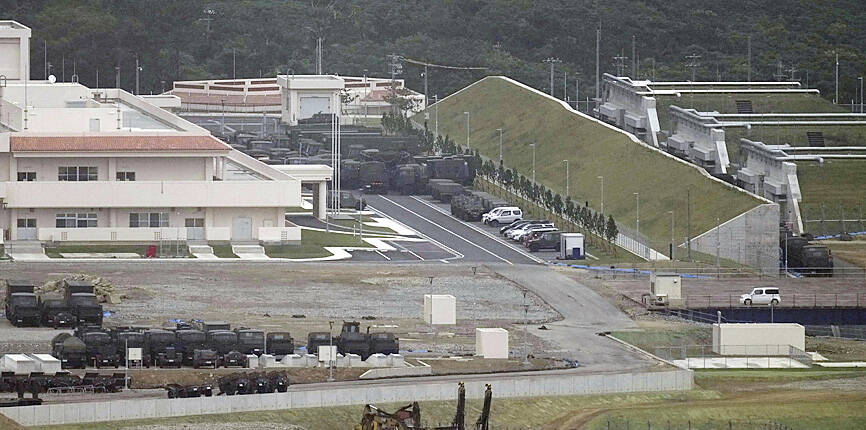The Japan Ground Self-Defense Force recently deployed a newly created ground-to-surface missile company that is to be based in Uruma City, Okinawa Prefecture, while expanding an electronic warfare unit on Yonaguni Island, Japan’s closest island to Taiwan.
A report by Kyodo News on Thursday said that the deployment was to bolster Japan’s defenses in its southwestern region in case sudden incidents occur around Taiwan.
The report said that the new company was named the 7 ground-to-surface missile company and is tasked with defending Miyakojima City, Ishigaki City and Amami Oshima Island.

Photo: AP
However, the report said that the Ground Self-Defense Force’s decision has raised discontent amongst the local populace, with 70 residents gathering in front of the force’s Camp Katsuren in protest on Thursday.
Opposition representatives said that if Okinawa residents accepted the company’s deployment without opposition, “there is no telling how the company will be reinforced,” adding that Okinawa should not become a weapon of war, the report said.
The report said that an electronic warfare unit, about 40 people strong, was deployed from Kumamoto Prefecture to Yonaguni to jam or interfere with hostile forces’ signals and radar stations.
Meanwhile, Yonaguni Island has been the home base of a 160-person electronic warfare unit since 2016, primarily tasked with monitoring the movements of nearby ships, the report added.
The Yonaguni garrison is expected to expand its base eastward, with a shooting range and munitions warehouse built in the new areas and facilities to house a planned deployment of a surface-to-air missile company, it said.
Ground Self-Defense Force Chief of Staff Yasunori Morishita told Kyodo News that the newly created unit would strengthen the force’s ability to react and deter a potential invasion by hostile forces.
Morishita said the force would explain to residents why the units’ deployment is necessary to safeguard Japan’s southwestern region.

ACTION PLAN: Taiwan would expand procurement from the US and encourage more companies to invest in the US to deepen bilateral cooperation, Lai said The government would not impose reciprocal tariffs in retaliation against US levies, President William Lai (賴清德) said yesterday, as he announced five strategies to address the issue, including pledging to increase Taiwanese companies’ investments in the US. Lai has in the past few days met with administrative and national security officials, as well as representatives from various industries, to explore countermeasures after US President Donald Trump on Wednesday last week announced a 32 percent duty on Taiwanese imports. In a video released yesterday evening, Lai said that Taiwan would not retaliate against the US with higher tariffs and Taiwanese companies’ commitments to

Intelligence agents have recorded 510,000 instances of “controversial information” being spread online by the Chinese Communist Party (CCP) so far this year, the National Security Bureau (NSB) said in a report yesterday, as it warned of artificial intelligence (AI) being employed to generate destabilizing misinformation. The bureau submitted a written report to the Legislative Yuan in preparation for National Security Bureau Director-General Tsai Ming-yen’s (蔡明彥) appearance before the Foreign Affairs and National Defense Committee today. The CCP has been using cognitive warfare to divide Taiwanese society by commenting on controversial issues such as Taiwan Semiconductor Manufacturing Co’s (TSMC, 台積電) investments in the

‘SPECIAL CHANNEL’: Taipei’s most important tasks are to stabilize industries affected by Trump’s trade tariffs and keep negotiations with Washington open, a source said National Security Council Secretary-General Joseph Wu (吳釗燮) arrived in the US for talks with US President Donald Trump’s administration, a source familiar with the matter said on Friday. Wu was leading a delegation for a meeting known as the “special channel,” the Financial Times reported earlier. It marked Trump’s first use of the channel since returning to the White House on Jan. 20. Citing a source familiar with the matter, the Financial Times reported that Minister of Foreign Affairs Lin Chia-lung (林佳龍) was also a part of the delegation. The visit came days after China concluded war games around Taiwan and amid Trump’s

HELPING HAND: The steering committee of the National Stabilization Fund is expected to hold a meeting to discuss how and when to utilize the fund to help buffer the sell-off The TAIEX plunged 2,065.87 points, or 9.7 percent, to close at 19,232.35 yesterday, the highest single-day percentage loss on record, as investors braced for US President Donald Trump’s tariffs after an extended holiday weekend. Amid the pessimistic atmosphere, 945 listed companies led by large-cap stocks — including Taiwan Semiconductor Manufacturing Co (TSMC, 台積電), Hon Hai Precision Industry Co (鴻海精密) and Largan Precision Co (大立光) — fell by the daily maximum of 10 percent at the close, Taiwan Stock Exchange data showed. The number of listed companies ending limit-down set a new record, the exchange said. The TAIEX plunged by daily maxiumu in just